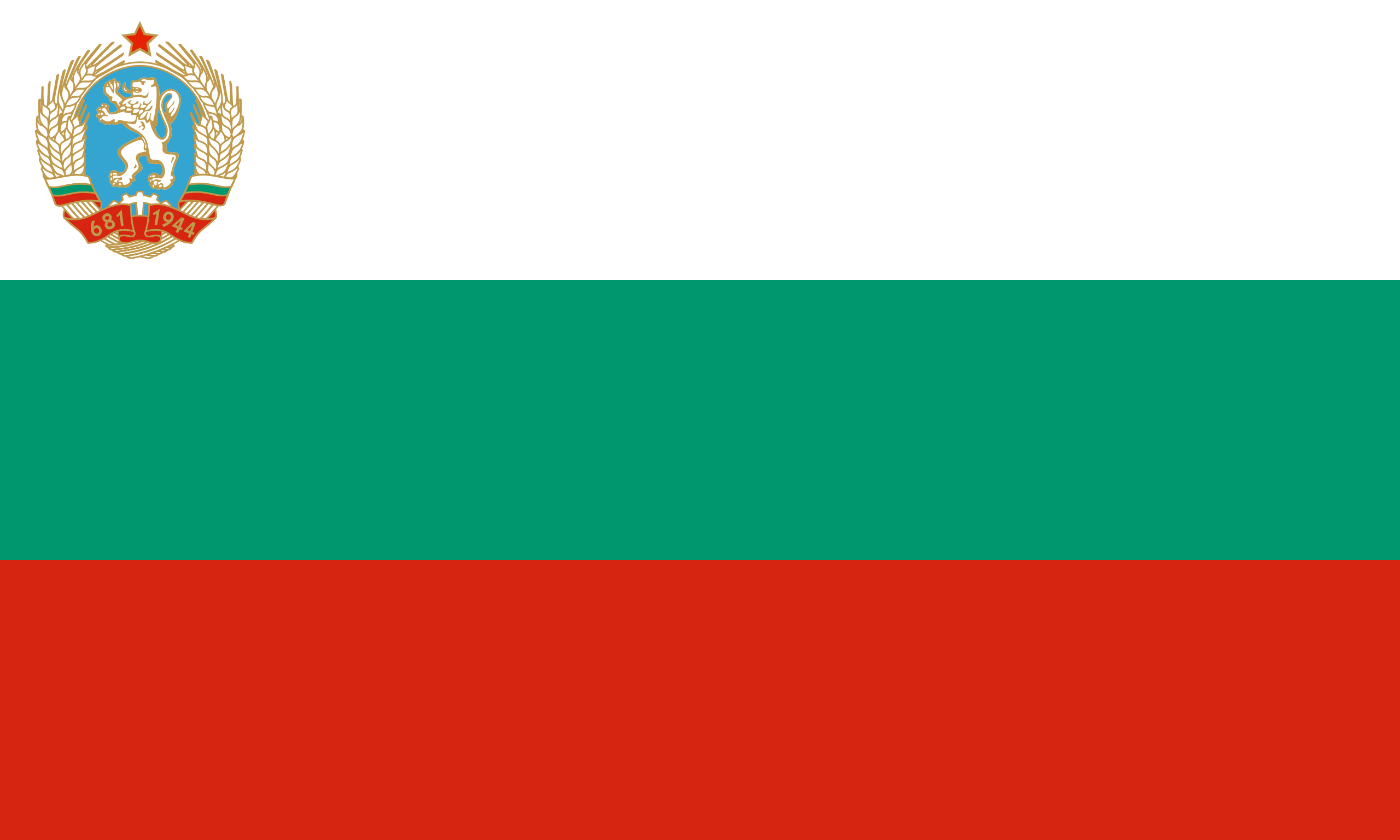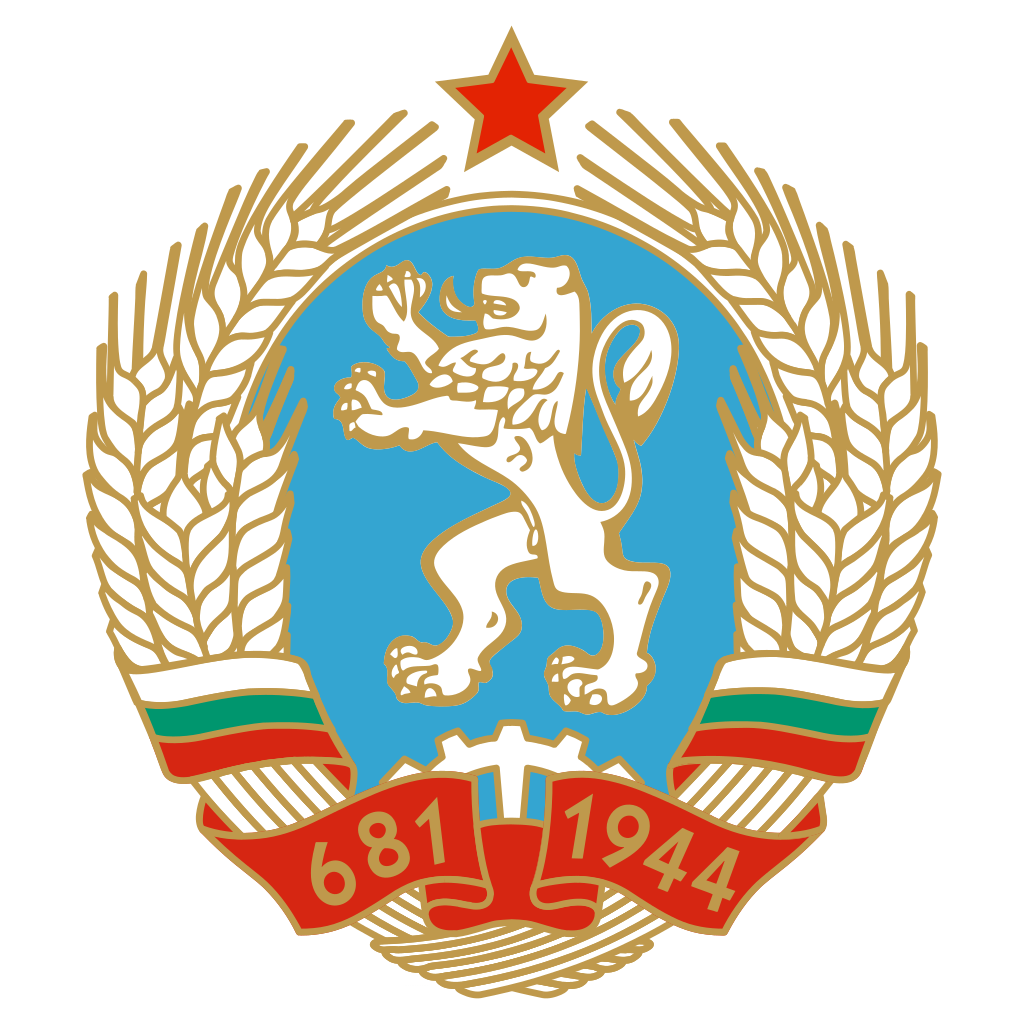More languages
More actions
| People's Republic of Bulgaria Народна Република България | |
|---|---|
Anthem: Шуми Марица (1946-1947) Републико наша, здравей! (1947-1951) Българийо мила, земя на герои (1951-1964) Мила Родино (1964-present) | |
| Capital and largest city | Sofia |
| Official languages | Bulgarian |
| Dominant mode of production | Socialism |
| Government | Unitary Marxist-Leninist people's republic |
| General Secretary | |
• 1946-1949 | Georgi Dimitrov |
• 1949-1954 | Vulko Cherenkov |
• 1954-1989 | Todor Zhivkov |
• 1989-1990 | Petar Mladenov |
• 1990 | Aleksandar Lilov |
| Head of State | |
• 1946-1947 (first) | Vasil Kolarov |
• 1990 (last) | Zhelyu Zhelev |
| Head of Government | |
• 1946-1949 (first) | Georgi Dimitrov |
• 1990 (last) | Andrey Lukanov |
| Legislature | National Assembly |
| History | |
• People's republic established | 15 September 1946 |
| 6 December 1947 | |
| 18 May 1971 | |
• De facto disestablished | 15 November 1990 |
• De jure disestablished | 12 July 1991 |
| Area | |
• Total | 110,994 km² |
| Population | |
• 1989 estimate | 8,987,000 |
| HDI (1990 report) | 0.918[1] |
| Currency | Bulgarian lev (BGL) |
| Driving side | right |
| Calling code | +359 |
| ISO 3166 code | BG |
The People's Republic of Bulgaria (PRB; Bulgarian: Народна Република България (НРБ), Narodna Republika Bŭlgariya, NRB) was a socialist state in south-eastern Europe, in the Balkan peninsula, that existed from 1946 to 1990. Its citizens had free healthcare and a retirement of age of 55 for women and 60 for men.[2]
History[edit | edit source]
Counter-revolution[edit | edit source]
In 1990, Bulgaria held its first multi-party elections since the Second World War. The Union of Democratic Forces coalition received $2 million from the NED to influence the election. Despite Western interference, the Bulgarian Socialist Party won 47% of the vote compared to 36% for the UDF. Hundreds of observers from Western Europe acknowledged that the election was fair.
On 6 July, President Petar Mladenov resigned due to a week of protests and a hunger strike outside parliament. Interior minister Atanas Smerdijev also resigned and parliament elected UDF leader Zhelyu Zelev as president. Counterrevolutionaries burned down and looted the headquarters of the Socialist Party.
On 23 November, the UDF stormed out of parliament after failing to remove Prime Minister Andrey Lukanov in a no-confidence motion. The UDF narrowly won the next election, but its cabinet and vice president resigned. In July 1993, protesters prevented the president from entering office for a month.[3]
Economy[edit | edit source]
Agriculture[edit | edit source]
From fall 1948 to spring 1949, 1,000 agricultural cooperatives were formed in Bulgaria, encompassing 13.3% of households in the country. By March 1949, the country's 1,600 cooperatives took up 5,400 km2 of land.[4]
Living standards[edit | edit source]
Education[edit | edit source]
Children between ages 9–13 participated in the Pioneers and youth aged 14–18 participated in the Komsomol.
All universities in Bulgaria were publicly owned under socialism. They were difficult to get into but had free tuition and guaranteed jobs after graduation.[5]
Health care[edit | edit source]
Bulgaria had one of the best medical systems in Eastern Europe and high-quality medications were available for low prices. Women had three years of partially paid maternity leave.[5]
Public transportation[edit | edit source]
Socialist Bulgaria had an excellent public transportation system. Bus tickets only cost four cents, 1/18 of what they now cost in Bulgaria.[5]
References[edit | edit source]
- ↑ Human Development Report 1990, p. 111
- ↑ Michael Parenti (2000). To Kill a Nation: 'Yugoslavia's Future: Is It Bulgaria?' (pp. 192–193). [PDF] Verso.
- ↑ William Blum (2004). Killing Hope: 'Bulgaria, 1990; Albania, 1991: Teaching communists what democracy is all about'. Common Courage Press. ISBN 9781567512526
- ↑ Organ of the Information Bureau of the Communist and Workers’ Parties (1949-11-18). "Development of Agricultural Co-operatives in Bulgaria" Retrieved 2022-04-17.
- ↑ 5.0 5.1 5.2 F.S. (2013-10-02). "An experiment in living socialism: Bulgaria then and now" Political Affairs. Archived from the original on 2022-06-18. Retrieved 2022-06-27.


